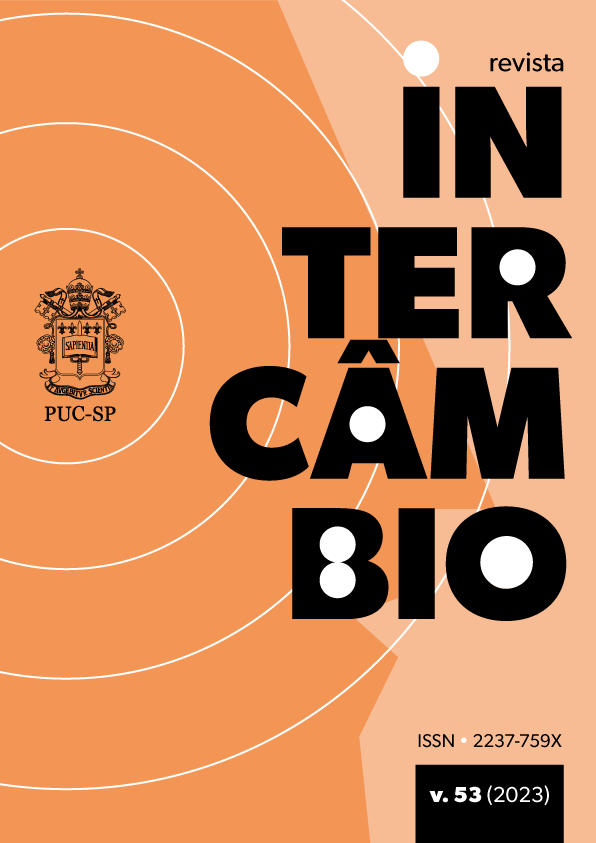Dysfemism political discourse in editorials
a systemic functional approach
DOI:
https://doi.org/10.23925/2237-759X2023V53e62941Keywords:
Editorial, Dysphemism, Persuasion, Appraisal, Conceitual metaphor and metonymyAbstract
Newspaper editorials use words as weapons to exerted ideological control trying to make the audience believe in their proposals. This study, relying on the notion of Appraisal and the metonymy- metaphor relationship, examines the dysphemism contributions in the criticism of President Jair Bolsonaro's trajectory. Therefore, it answers these questions: (a) What is the contribution of Appraisal to the dysphemism analysis concerning political discourse? (b) What does the relation metaphor-metonymy play through dysphemism? The results show the strength of dysphemism in relying on the editorial's proposal to show Bolsonaro's inability as President.
References
ALLAN, K.; BURRIDGE, K. Euphemism and Dysphemism: language used as shield and weapon. New York: Oxford University Press, 1991.
ALLAN, K.; BURRIDGE, K. Forbiden words: taboo and the censoring of language. New York: Cambridge University Press, 2006.
BARCELONA, A. The cognitive theory of metaphor and metonymy. In: BARCELONA A. (ed.)., Metaphor and metonymy at the crossroads: a cognitive perspective. Berlin: Mouton de Gruyter, p. 1-28, 2000a.
BARCELONA, A. On the plausibility of claiming a metonymic motivation for conceptual metaphor. In: Barcelona A. (ed.)., Metaphor and metonymy at the crossroads: a cognitive perspective. Topics in English linguistics. Berlin: Mouton de Gruyter, p. 31-58, 2000b.
BROWN, P.; LEVINSON, S. C. Politeness: some universals in language usage. Cambridge: Cambridge University Press, 1987.
CARVER, T.; PIKALO, J. Political Language and Metaphor: Interpreting and Changing the world. In: Routledge innovations in Political Theory., London, Routledge, 2008.
CHARTERIS-BLACK, J. Corpus approaches to critical metaphor analysis. New York: Palgrave Macmillan, 2004.
CHARTERIS-BLACK, J. Politicians and rhetoric – the persuasive power of metaphor. New York: Palgrave Macmillan, 2005.
CHILTON, P. Analysing political discourse:theory and practice. London: Routledge, 2004.
CRESPO-FERNÁNDEZ, E. El eufemismo y el disfemismo:procesos de manipulación del tabú en el lenguaje literário inglés. Alicante: Publicaciones de la Universidad de Alicante, 2007.
CRESPO-FERNÁNDEZ, E. Words as weapons for mass persuasion: dysphemism in Churchill’s wartime speeches. Text & Talk, 33.3: 311-330, 2013.
CROFT, W. The role of domains in the interpretation of metaphors and metonymies. Cognitive linguistics, 4: 335-370, 1993.
DIRVEN, R. Metonymy and metaphor: different mental strategies of conceptualisation. Leuvense bijdragen, 82: 1-28, 1993.
FORCEVILLE, C. Non-verbal and multimodal metaphor in a cognitivist framework: agendas for research., In: FORCEVILLE, C.; URISO-APARISI, E. (ed.). Multimodal Metaphor, Berlin: De Gruyter, 2009.
GEERAERTS, D. The interaction of metaphor and metonymy in composite expressions. In: DIRVEN, R.; PÖRINGS, R. (ed.). Metaphor and metonymy in comparison and contrast. Berlin: Mouton de Gruyter, 2003.
GOFFMAN, E. Interaction ritual: essays on face-to-face behavior. New York: Pantheon Books, 1967 [1955].
HAKAM, J. The 'cartoon controversy': a critical discourse analysis of English-language Arab newspaper discourse. Discourse & Society, 33-57, 2009.
HALLIDAY, M. A. K. Introduction to Functional Grammar.Londres: Edward Arnold, 1994.
HALLIDAY, M. A. K.; MATTHIESSEN, C. M. I. An introduction to Functional grammar. London: Arnald, 2004.
KITIS, E.; MILAPIDES, M. Read it and believe it: how metaphor constructs ideology in news discourse, a case study. Journal of Pragmatics, 28: 557-590, 1997.
LAKOFF, G. The contemporary theory of metaphor. In: ORTONY, Andrew (ed.) Metaphor and Thought. Cambridge: Cambridge University Press, 202-251, 1993.
LAKOFF, G.; JOHNSON, M. Metaphors we live by. Chicago: The University of Chicago Press, 1980.
LAKOFF, G.; TURNER, M. More than cool reason: a field guide to poetic metaphor. Chicago: The University of Chicago Press, 1989.
LEMKE, Jay L. Resources for attitudinal meaning – evaluative orientations in text semantics. Functions of Language, 5,1. 33-56, 1998.
LI, J. Transitivity and lexical cohesion: press representations of a political disaster and its actors. Journal of Pragmatics, 42.12: 3444-3458, 2010.
MARTIN, J. R. Language, register and genre. In: CHRISTIE F. (org.). Language studies: children´s writing: reader. Geelong: Deakin University Press, 1984.
MARTIN, J. R. The English text – System and structure: Amsterdã: John Benjamins, 1992.
MARTIN, J. R. Beyond exchange: Appraisal Systems in English. In:
HUNSTON, S.; THOMPSON, G. (org.). Evaluation in text: authorial stance and the construction of discourse. Oxford: University Press, 2000.
MARTIN, J. R. Introduction. In: MACKEN-HORARIK, M.; MARTIN, J.R. (org.). Text and Talk, 23.2: 171-181, 2003.
MARTIN, J. R.; WHITE, P. R. R. The language of evaluation: Appraisal in English. Londres: Palgrave Macmillan, 2005.
MUSOLFF, A. Metaphor and political discourse: analogical reasoning in debates about Europe. London: Palgrave Macmillan, 2004.
MUSOLFF, A. Metaphor, Nation an the Holocaust: The concept of the body politic. London: Routledge, 2010.
PANTHER, K.; RADDEN, G. Metonymy in language and thought. Amsterdam: John Benjamins, 1999.
PARTINGTON, A. The linguistics of political argument: the spin-doctor and the wolf-pack at the White House. London, England: Routledge, 2003.
RADDEN, G. How metonymic are metaphors? In: BARCELONA, A. (ed.). Metaphor and metonymy at the crossroads. Berlin: Mouton de Gruyter, 2000.
RUIZ DE MENDOZA IBÁÑEZ, F. J. The role of mappings and domains in understanding metonymy. In: BARCELONA, A. (ed.). Metaphor and metonymy at the crossroads. Berlin: Mouton de Gruyter, 2000.
SCHÄFFNER, C. Metaphor and interdisciplinary analysis. Journal of Area Studies, 11: 57–72, 1997a.
SCHÄFFNER, C. Translation Studies. In: VERSCHUEREN, J.; ÖSTMAN, J.-O., BLOMMAERT, J., BULCAE, C. (ed.). Handbook of Pragmatics. Amsterdã: John Benjamins, 1–17, 1997b.
TAYLOR, J. R. Linguistic Categorization: Prototypes in Linguistic Theory. Oxford: Clarendon Press, 1995. [1989]
THOMPSON, G.; THETELA, P. The sound of one hand clapping: the management of interaction in written discourse. Text & Talk, 15.1: 103-128, 1995.
VAN DIJK, T. A. Elite discourse and racism. Newbury Park, CA: Sage, 1993.
VAN DIJK, T. A. Discourse as social interaction. Spain: Pompeu Fabra University, 1997.
VELASCO-SACRISTÁN, M. Metonymic grounding of ideological metaphor: evidence from advertising gender metaphor. Journal of Pragmatics, 42: 64-96, 2010.
WHITE, P. R. R. Beyond modality and hedging: a dialogic view of the language of intersubjective stance. In: Text, 23.2, 259-284, 2003.
Downloads
Published
How to Cite
Issue
Section
License
Copyright (c) 2023 Sumiko Nishitani Ikeda, Adriana Baldas Kutz Bertelli

This work is licensed under a Creative Commons Attribution 4.0 International License.






